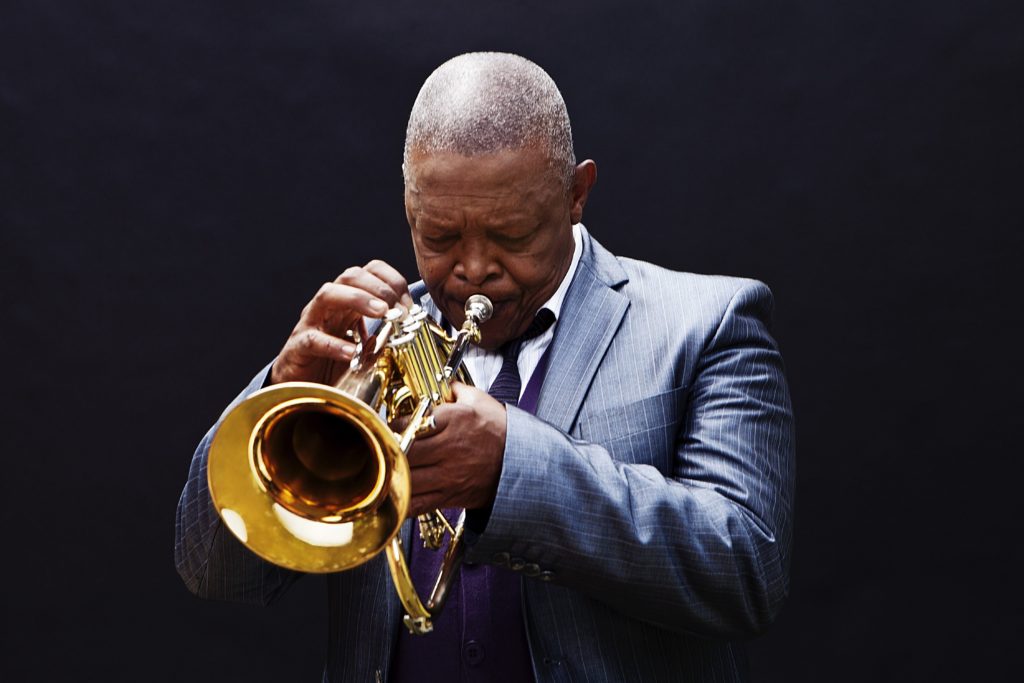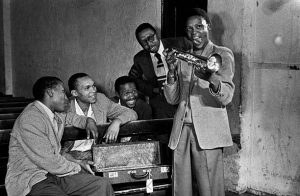South African legend Hugh Masekela can’t help but make political music

Hugh Masekela, courtesy.
Internationally acclaimed trumpeter, flugelhornist and composer Hugh Masekela never chose to be the musical voice of a defiant South Africa.
Hugh Masekela and Vusi Mahlasela
8 p.m. March 11
Zellerbach Auditorium, UC Berkeley
Tickets: $30-$72.
“I was just a musician, making a living. And it was coincidental that I came from South Africa. You can’t come from a people whose resources you use and not talk about them. I never elected myself as the representative,” says Masekela, 75. “I came from a country and a community that was oppressed and grew up fighting that oppression. I was just one of millions of people.”
True – but Masekela is one of a handful of South African musicians to gain worldwide praise and attention. And his music has provided the soundtrack to the anti-apartheid movement.
Celebrating the 20th anniversary since the start of democracy in South Africa, and performing songs from the movement, Masekela and vocalist Vusi Mahlasela (known as “The Voice” in his native country ) are collaborating on a month-long U.S. tour, “20 Years of Freedom: featuring South Africa’s Freedom Songs,” that comes to Cal Performances in Berkeley on Wednesday.
Inspired by American jazz in the 1950s, Masekela began a five-decades-long career of music that protested apartheid and slavery, and portrayed hardships and hopes of an entire people.
In the U.S., he had Top 40 albums and hits including the No. 1 instrumental “Grazing in the Grass” in 1968. He recorded more than 40 albums and has worked with the likes of Dizzy Gillespie, The Byrds, Fela Kuti, Marvin Gaye, Paul Simon and Stevie Wonder.
Masekela moved to New York to continue his education after being forced from his homeland in 1960, when the increasingly brutal apartheid government banned public gatherings. He did not return until 1990, when Mandela and all political prisoners were freed.
“I started a career that I hadn’t planned, and it flowered and flowered,” he says. “I had a very successful exile.”
Even as Masekela’s music gave hope to millions, and his 1987 song “Bring Him Back Home (Nelson Mandela)” became a worldwide rallying cry for the release of the country’s future president, he never envisioned a South Africa free from apartheid.
“What people don’t know is that from the time Europeans arrived in South Africa in 1652, until 1994, we were basically at war,” he says. “We grew up in (protests), marches and demonstrations, police arrests and then jumping fences. We grew up learning to outsmart them. They had to end (apartheid) because the country was finally rendered ungovernable by the people. Those people … and the ones who were killed … were the true heroes in the struggle for freedom in South Africa.”
Q&A: Hugh Masekela recalls those who paved his path and Monterey Pop ’67

South African musician Hugh Masekela plays the trumpet he has just received as a gift from Louis Armstrong, via local chaplain Father Trevor Huddleston, in 1954. Photo: Jurgen Schadeberg.
Hugh Masekela, who turns 76 in April, is not only an accomplished jazz and world musician, with several Top 40 albums, a No. 1 hit and a rich history of collaborators, but a storied chronicler of the freedom movement during apartheid.
Your music really laid the footsteps for a lot of African artists throughout the years with success in Europe and the U.S.
The person who really opened it for us was Miriam Makeba. We grew up together and were husband and wife at one time. She asked me to come to the United States to go to music school, along with Harry Belafonte, who she was working with at that time.
Did performing at the Monterey Pop Festival in 1967 have a big impact on your career?
Not really. I think that at Monterey Pop, I was not as noticed as Janis Joplin, or Otis Redding, or The Who, or Jimi Hendrix. They are people whose careers really catapulted from that. But I was already on a roll when that came around (festival). And the following year, I had a number one record. In 1967, I had a couple of top 40 records, so my career was in the making. But it was just another festival. I played a lot of festivals. I was very tight with what I would call activist musicians. My best friends were people like David Crosby, Steven Stills, and Jimi Hendrix became a great friend. And Paul Simon – we had the same producer.
Follow editor Roman Gokhman at Twitter.com/RomiTheWriter.
